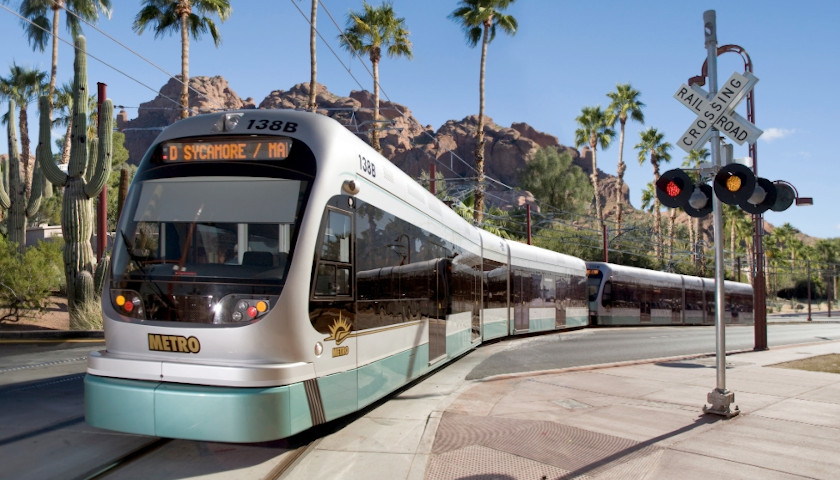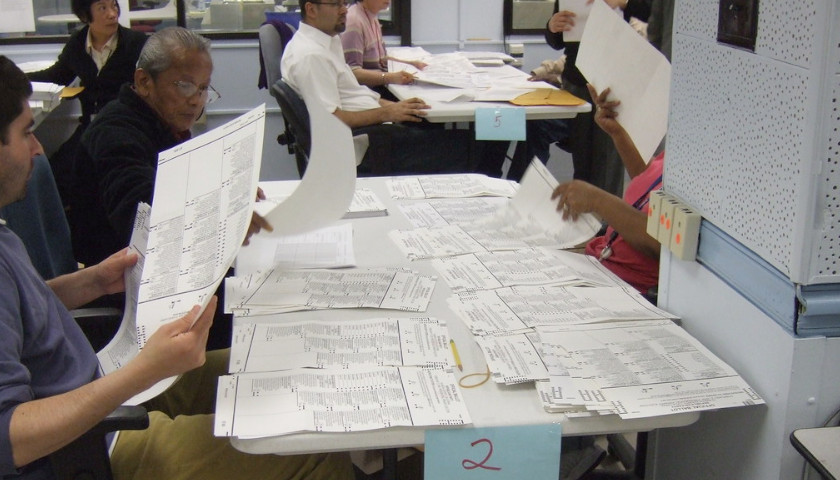A transportation bill dubbed the “Maricopa County Transit Slush Fund Tax” by the Arizona Free Enterprise Club (AFEC) is steadily advancing through the legislature, and its supporters say it will probably make it through the Arizona Legislature this year in a referral to the ballot. Senate Bill (SB) 1356 has passed the Senate, the Senate Transportation and Technology Committee, and the House Transportation Committee. Valley Metro’s new CEO Jessica Mefford-Miller said this week about it, “We are cautiously optimistic about SB 1356.”
The bill extends a half-cent tax that has funded various transportation projects for 25 years, particularly public transportation and light rail. Originally known as Prop. 400, the tax will fund 12 more miles of light rail, 186 more miles of HOV lanes, 36 miles of bus rapid transit, over six miles of streetcar tracks, and 367 new miles of highway. Local officials can also use the money to create more bicycle lanes.
Out of concern that the funding’s priority is not roads, AFEC described SB 1356 “as a complete boondoggle. If passed and signed into law, most of the money would go to transit and pet projects.” AFEC warns, “this isn’t a plan to build roads and freeways — or improve how we move people from point A to point B.”
State Senator J.D. Mesnard (R-Chandler) said he voted against the bill due to the large portion for light rail. One-third of the revenue from the tax is earmarked for light rail and other public transportation. AFEC said the result of this tax over the last few years is “cities like Phoenix, Mesa and Tempe have cannibalized hundreds of millions of dollars meant to be spent on regional projects in order to build trains to nowhere. Taxpayers have spent billions of dollars for these boondoggles to provide transit to less than 1% of the population.”
The latest light rail expansion in Phoenix “cost $245 million per mile to construct, reduced lanes on already congested roads, needs to be continuously subsidized with tax dollars for operations and siphons resources from critical road maintenance projects.”
State Senator Michelle Ugenti-Rita (R-Scottsdale) said there was no urgency to pass it this year since the currently authorized Prop. 400 tax doesn’t expire until 2025 and she criticized Republicans for supporting a tax increase.
“We have some members that are requesting that we suspend the 18 cents gas tax,” she said on the House floor in March. “We’re sending mixed messages. There’s no reason we need to do it now. We can do this in 2024. Coming up on an election, this is the worst thing Republicans can do, is mandate a historic tax increase be placed on the ballot.” Ugenti-Rita said Gov. Doug Ducey should veto the bill if it gets that far.
State Senator Tyler Pace (R-Mesa) sponsored the bill in the Senate, and its corollary in the House, House Bill (HB) 2598, is sponsored by State Representative Frank Carroll (R-Sun City). AFEC noted that the legislators pushing the bill also drafted the language that would appear on the ballot about it, describing the effects of a “yes” or “no” vote. In order to come up with that language, they used taxpayer funding to figure out through focus groups what language would resonate the best with voters, and included language in the bill allowing for more paid polling. The legislation also provides unlimited funding through the roadway fund for Maricopa County to drive supporters of the tax to the polls to vote for it.
AFEC stated, “Arizona does not have a transportation funding crisis. Arizona has a transportation wasteful spending crisis.”
Arizona already gets money for transportation from gas taxes, registration and title fees, county and city transportation taxes, appropriations from the General Fund, and money from the federal Highway Trust Fund. The $1.2 trillion federal Infrastructure Investment and Jobs Act, which was drafted in part by Sen. Kyrsten Sinema (D-Ariz.) contains $5.3 billion for Arizona roads and bridges, and $884.3 million for Arizona transportation systems like Valley Metro.
Fewer people are on the roads now due to a significant shift all over the country to telecommuting. Both legislators sponsoring the transportation bill have mediocre ratings from the American Conservative Union. Pace has a lifetime rating of 80 and Carroll has an 87.
If a handful of Republican legislators vote with the Democrats in the House in support of the bill, as they did in the Senate, it will pass. However, they are running out of time. Legislators are focused on wrapping up the budget by June 30, when the 2022 session ends. Additionally, in order to make the ballot on time, Ducey must sign the bill into law by June 25.
– – –
Rachel Alexander is a reporter at The Arizona Sun Times and The Star News Network. Follow Rachel on Twitter. Email tips to [email protected].
Photo “Phoenix Light Rail” by Phoenix_Exterior_Camelback. CC BY 2.0.





